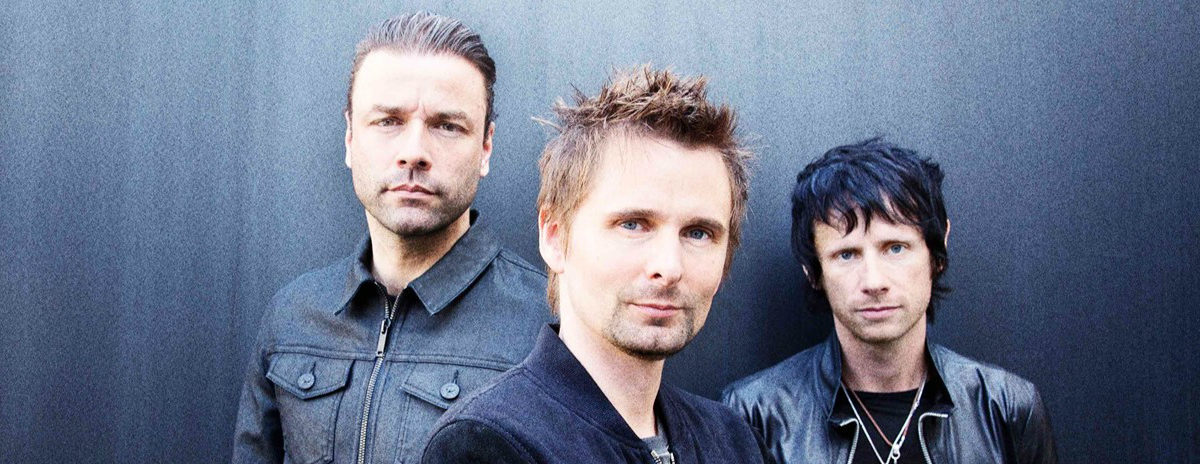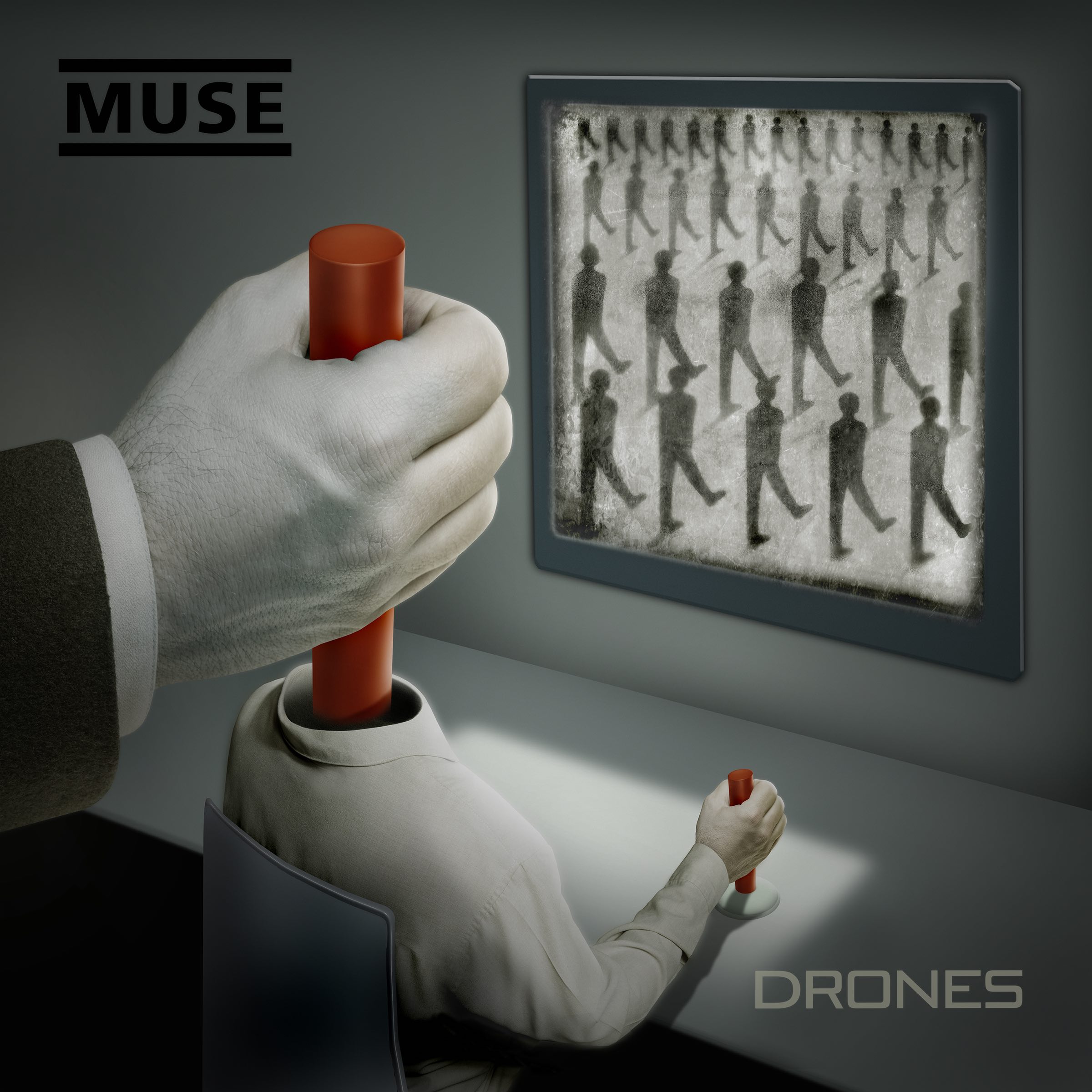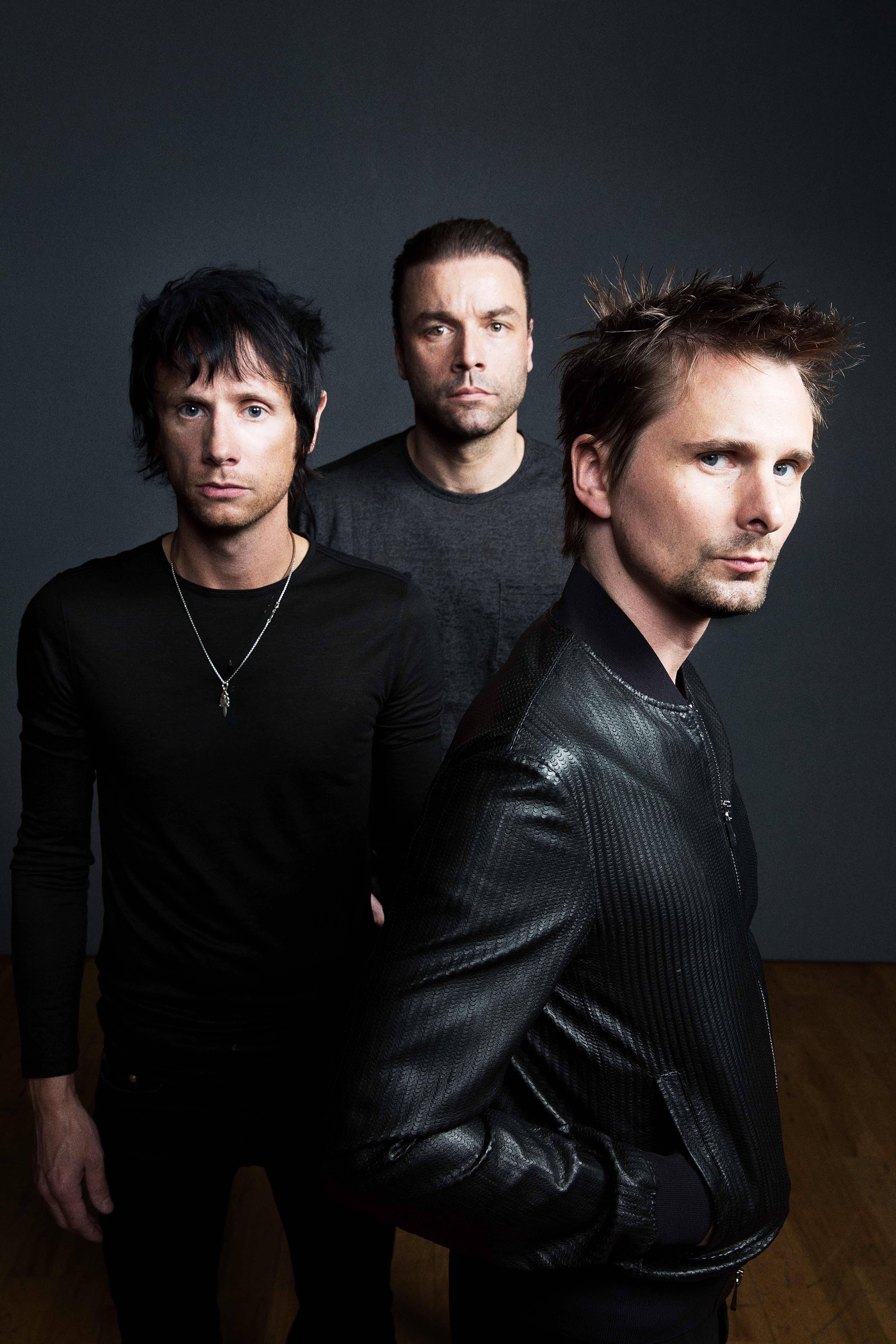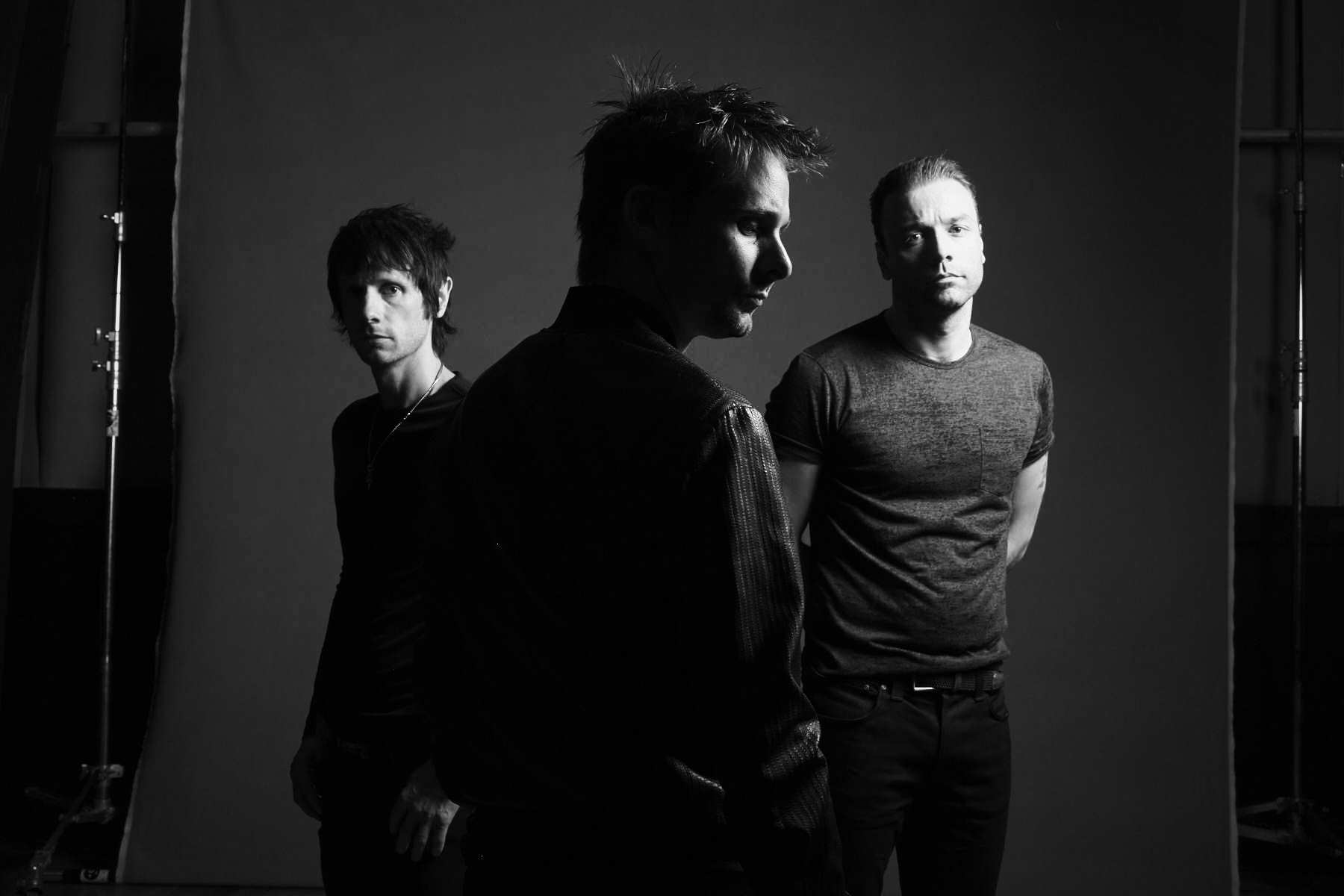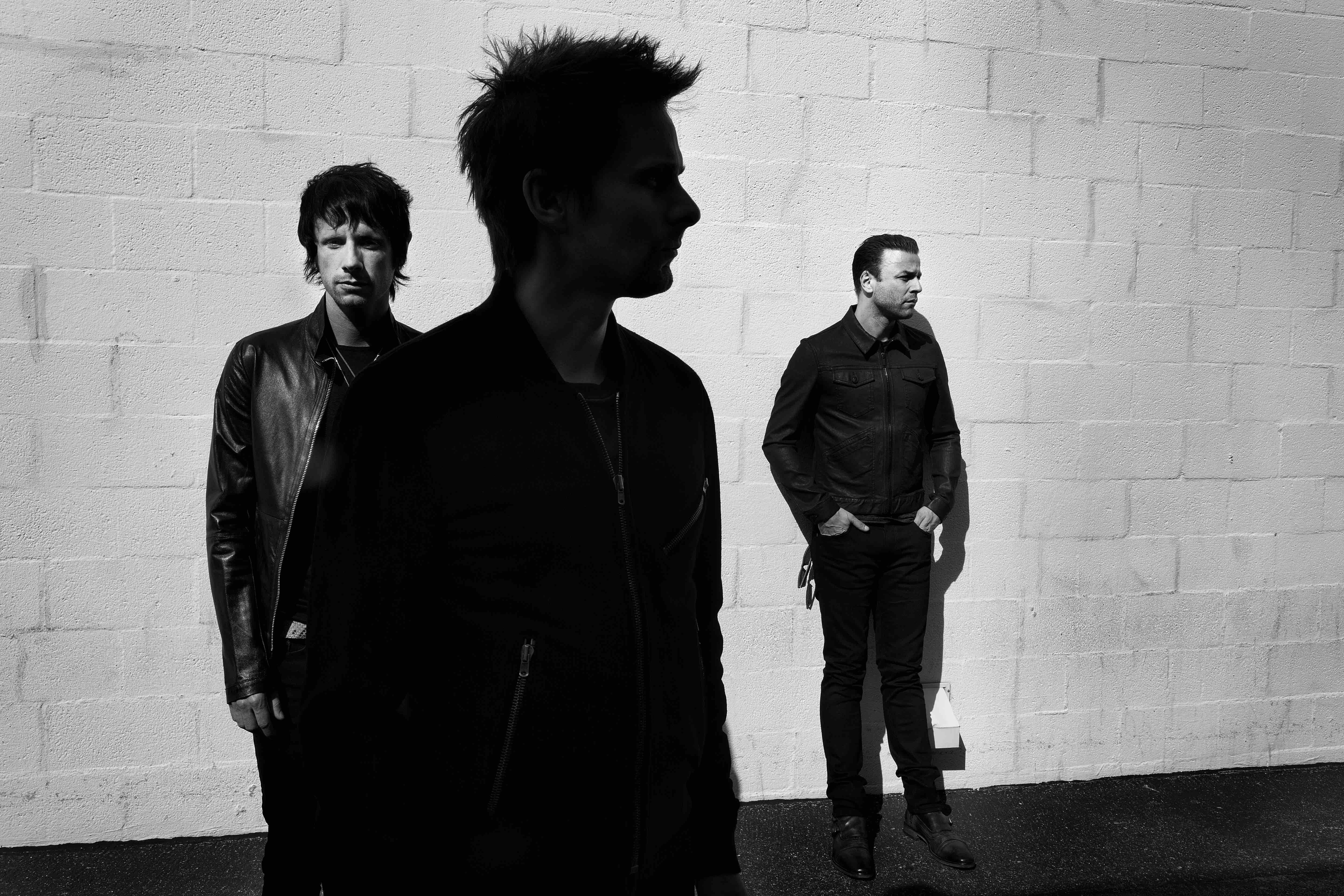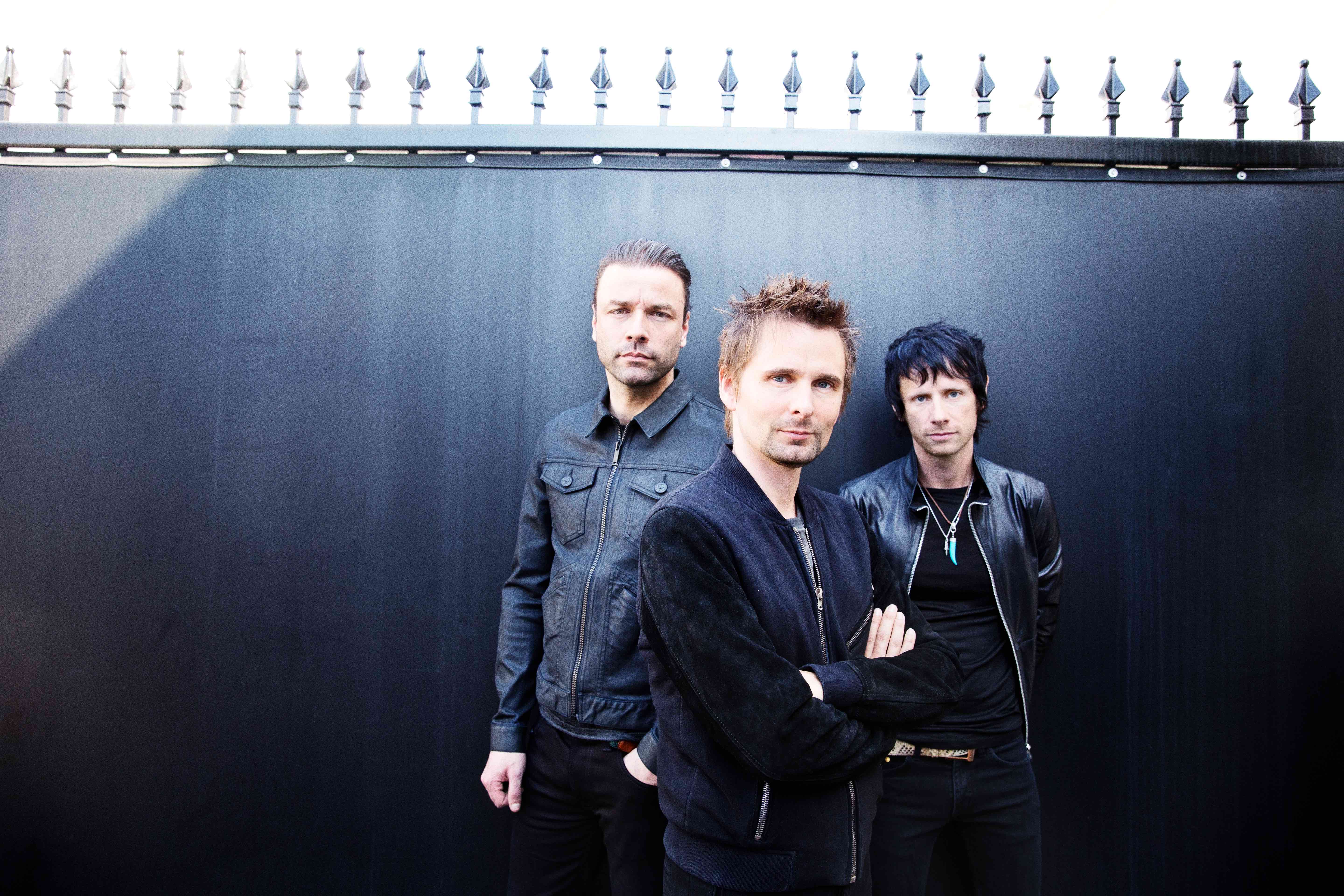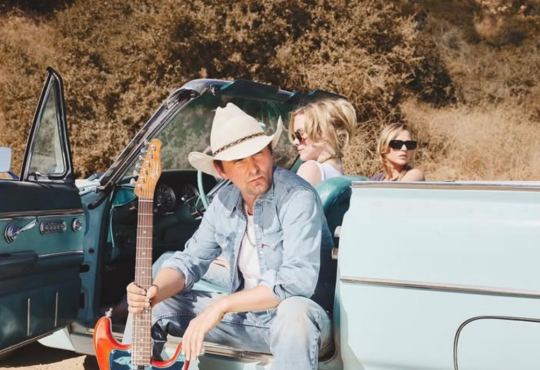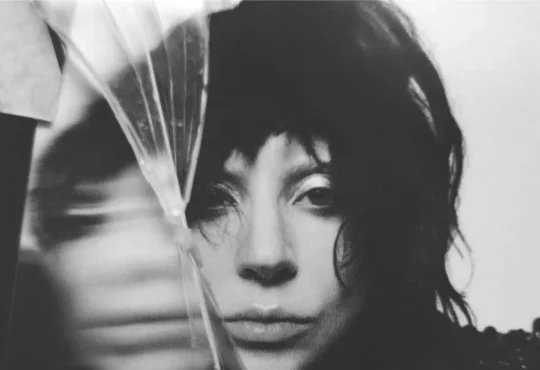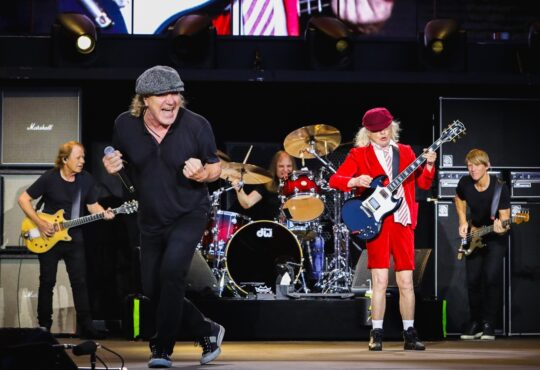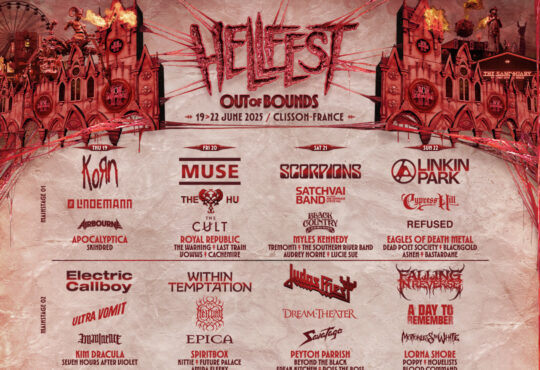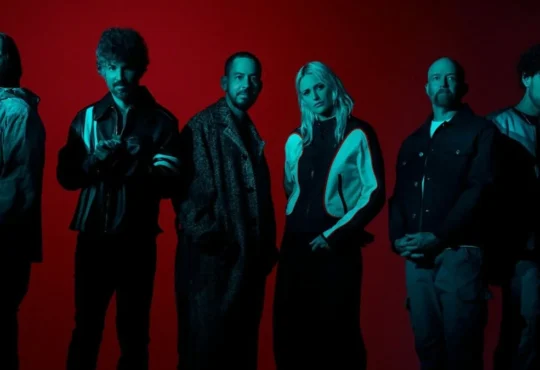Last month, legendary band Muse came in Paris to talk about their new album, “Drones”. In their beautiful parisian hotel, we met Christopher Wolstenholme (bass), who tells us a bit more about it.
First question: How are you? Happy to be in Paris? There’s a lot of fans waiting for you in front of the hotel!
Christopher Wolstenholme (bass): I’m very good! It’s nice to be back. Every time we stay here there’s always quite a lot of fans. Some of them were even hanging out there last night! (laughs)
Your new album, “Drones“, just came out. How are the feedback so far?
C: It’s been great! You know, in my point of view, it’s very nice that the album finally out because we’ve been talking about it for about three months. And it’s kind of a strange period when you finish making the album and you start to see this kind of buzz developing, and yet no one really heard it. It always makes you question it a lot. You start to look at people’s expectations. And you get to the point where you just want the album to be released so people can hear it. So it’s nice that it’s finally out there. And I think the reception’s been great. I feel like it’s an album people wanted.
There are a few tracks you’ve already played on stage. Was the reception as good?
C: Yes, I think this album works better on stage than the last one, because it’s much more rock. When we made “The 2nd Law” there were some songs on which we were like “shit, I don’t know how to play this live” ! But in this album, for the most part, it’s just guitar, bass and drums. Rehearsals where really easier. Usually, that’s a period of time that’s quite stressful and here we just knew this album would work live. “Psycho” is the first song we’ve played live and it has a riff in it that’s been around for a long time so people already made a connection with our songs. It’s actually the best reception we’ve had for a song ever, I think.
You’ve worked with producer Robert “Mutt” Lange on “Drones”. How and why did this happen? We know that you’ve self-produced the two previous albums.
C: I think it was always our intention, to have a producer. Even when we made “The 2nd Law”, we talked about having one. But the people we wanted to work with weren’t avaliable at the time. So we kind of just started working on “The 2nd Law” and before we knew it, we finished it by ourselves! (laughs) So on this album, again, we wanted to work with a producer. But I think because we had very different ideas on what we wanted this album to sound so we wanted to make sure that we didn’t stray away from that. Because quite often, when a band is left on their own in the studio, anything can happen. And that’s what “The 2nd Law” was like. When we made that album it was probably our intention for it to be a rock album, and then I think, because we were producing ourselves, we spent more time in the control room and less time in the live room. And we wanted to make sure that was the opposite this time. We wanted to be playing our instruments more. And in order to do that we had to have somebody else in the control room doing the producing. And it was great because we were able to go in and play the songs and then let somebody else decide what was good. It’s very difficult when you do a take and then the three of us have to decide which is the best one. Because we’re three friends, and we have to be very critical of each other, it’s quite a difficult thing to do. So having someone like Mutt Lange made the whole process a lot easier because we would just record a bunch of takes and leave the studio, and he would take the best ones. I think it made us feel like a band again.
How long did it take to make “Drones”? Writing, recording and then producing.
C: It’s hard to say with the writing. I’m not really sure when Matt started writing. (laughs) I think he started writing the songs probably at the end of the last touring period. But it wasn’t until April or May last year that we started to work on it as a band. We started doing rehearsals, really casually over the summer. And we didn’t have any deadlines or targets or any idea of when we wanted to release it so we were just really casual about it. But before we knew it the album was kind of ready to go. We went to Vancouver in October to start recording. That’s when we did most of the “band stuff”. And after that Matt did vocals on his own. It was probably 3 or 4 months of rehearsing, 3 or 4 months of recording, 3 or 4 months writing probably. (laughs) All of it was probably a year and a half in the making.
Matt said in a few interviews that you might use actual drones on stage in the future. And we know your show are already quite spectacular. What can we expect next?
C: Yeah, I thing the drones thing is something we really want to do. I think the great thing with this album is that there’s such a strong concept in the texts of the album. We could take those concepts and apply them to the live shows. So the whole thing of having drones flying around the arena is something that we’re looking at. I think it’s going to be a really different type of show. I think we’re going to try to get away from the traditional “band at one end of the room, big screens etc” thing and try to do something a little bit different, something that we haven’t done before. It will be as big and wonderful as it always is hopefully. (laughs) I can’t really tell you how it’s gonna be, because we don’t know ourselves yet.
Any chance to see you in France, especially in Paris in the future?
C: Probably not until next year. That was one of the main reasons for doing the festivals. We start touring in South-east Asia, and then we’re going to South America and to the States, so we wanted to make sure we did a bunch of stuff in Europe before that, and next year, we’ll come back again.
You’re starting to be one of those bands with a very large discography, what are you going to do about the setlist? You obviously can’t play everything.
C: It’s very difficut. We had this crisis in the first rehearsals that we did. We were trying to write a list of songs that we have to play. And even just songs that we have to play was too long. (laughs) There are songs like “Plug In Baby” that made us wonder “can we leave it out?” but we kind of have to play it. But we want to play some new songs as well. We have about ten new songs to put into the set, which means it’s ten songs from the last album or from the previous albums that we can’t play. But I think the setlist will have to be quite different every night. We’re gonna have to rotate the set quite a lot in order to play all the songs that we want to play. There will be some nights where people might not get to hear everything they want to hear, but… Unless we play for four hours but I don’t think we can. (laughs)
You’ve already been to small venues, and big ones, and stadiums. A lot of people listen to you, both music aficionados and the mainstream audience. You’ve even played at the Olympic Games. What do you want to conqueer now, if anything’s left?
C: I actually think there’s still a lot of places we haven’t been to. Places that are difficult to get to. There are places like India we’ve never been to, a lot of China we’ve never been to. Sometimes I feel like we’ve been everywhere, but then you look at the map and you realize we haven’t been to many places at all really. So for me, it’s about getting to new places, doing new things. I still feel like there’s a lot to achieve. Like stadium gigs. We’ve done stadiums here, we’ve done them in the UK, but there’s a lot of places where we haven’t done stadiums and it would be great to do stadiums in those kinds of places, like in the US or Eastern Europe or Asia or South America. I still feel like the band is building.
What do you like better : stadiums, small venues, both?
C: They’re very different. When you do the stadiums shows, it’s amazing. You don’t really get any bigger than that, and I think it’s propably the one thing I never expected this band to do. I don’t think any band, when they start out, can even dream about playing the Stade De France or Wembley Stadium. So when you achieved that you actually feel like you’ve surpassed your dreams. To walk out in front of that many people in here screaming is quite an amazing feeling. But at the same time we did a handful of small shows in the UK in March, and it was amazing ! It was absolutely incredible. We hadn’t played venues like that for years and, to go back in some venues we played “Origin Of Symmetry”. I loved those gigs. I said to the guys “it’s a shame we can’t do more gigs like that”. Because when you do small gigs, a lot of people don’t get to see you. So yeah, they’re very different. Very different types of atmospheres. I think the thing is it’s nice to mix it up. If you do too much of one thing, you get bored.
Listening to “Drones”, we thought it would fit for both big and small venues. Knowing the themes it’s about, you could even write a science fiction movie with it. Would like to, if you had the occasion ?
C: Yeah absolutely! Actually a lot of people have talked about that, turning it into a musical or a movie or something like that. It would be great if somebody else came to us, saying “we want to turn his album into something else”. It’s probably not something we could do on our own, because we already have all our commitments to Muse, to music and touring, so at the moment it would be impossible for us to even think about doing something else. But if somebody came to us saying “I’d really like to make a musical or a movie”, and it was some one we liked and trusted, then I think it would be a possibility, yeah.
The themes in the album are things you’ve already mentionned before, but they are very central in “Drones”: dictatorship, wars, control of the populations, and you’re giving much of your opinion about those things. What do you think of an artist’s role, regarding politics and society? Do you try to open people’s eyes?
C: Well, I guess so a little bit. But I don’t think people really need their eyes opening to it much, a lot of people know what’s happening these days. I don’t think were trying to preach, we’re not trying to tell people how they should think or what they should believe in. I think a lot of it is more observational. It’s what you see when you put the news on, it’s what you see when you read the newspapers, it’s kind of around us. I think, from Matt’s point of view when he writes the lyrics, it’s just how he sees the world today.
Do you personally have a theme, or even a track you’re particularly attached to?
C: (Long thinking) I really like “The Handler”. It’s probably one of my favorites. I think lyrically it’s really cool, and musically it’s probably the one song that has the closest connection to Muse of ten years ago, and it’s kind of nice to go back to that. I also think “The Globalist” is great, as a piece of music. It was quite challenging to record. I think it’s gonna be very hard to play live. (laughs)
The track “Drones” was quite surprising, it almost sounds like a gregorian chant.
C: Yeah, we thought it was a great ending to the album. You don’t really know where it ends, what the ending of the story is. And the whole thing with gregorian music and choral music in general is that it’s quite ambiguous in the way that it sounds. Sometimes you can listen to it and feel very happy, sometimes you can listen to it and it sounds very sorrowful. And I thought it was a great way to end the album because I guess depending on what mood you’re in when listening to that piece of music, you can see it as a positive or a negative ending.
We have one last question : our media is called “RockUrLife”, so what rocks your life?
C: Music and football. I love football, I’ve always been into it as far as I can remember. I just love football, I don’t know why! (laughs) I love watching it, I love playing it. It’s kind of my second life outside of music.
Website: muse.mu



